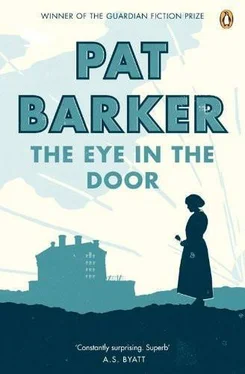‘All the better to eat you with,’ said Mrs Riley. ‘And who are you calling Grandma?’
Mrs Thorpe asked, ‘How long have you got, love?’ And then, before he had time to answer, ‘Eeh, aren’t we awful, always asking that?’
‘Two days.’
‘Well, make the most of it. Don’t do anything we wouldn’t do, mind.’
He smiled. ‘How much scope does that give me?’
‘Fair bit, these days,’ said Mrs Riley.
He remembered, suddenly, that he’d sucked the breasts of both these women. His mother had been very ill for two months after his birth, and he’d been fed on tins of condensed milk from the corner shop, the same milk adults used in their tea. Babies in these streets were regularly fed on it. Babies fed on it regularly died. Then Mrs Thorpe and Mrs Riley had appeared, at that time, he supposed, lively young girls each with her own first baby at her breast. They had taken it in turns to feed him and, in so doing, had probably saved his life. He had known this a long time, but somehow, when Mrs Thorpe and Mrs Riley had been shapeless bundles in shawls, it had not registered . Now, though not easily discomforted, he felt himself start to blush.
‘Look at that,’ said Mrs Riley. ‘He’s courting, I can always tell.’
‘Are you courting?’ Mrs Thorpe asked.
‘Yes. Her name’s Sarah. Sarah Lumb.’
‘Good strong name that,’ said Mrs Riley.
‘She’s a good strong lass.’
‘Mebbe has need to be,’ said Mrs Riley, looking him up and down, speculatively. ‘Do y’ fancy a drink?’
‘No, I’d like to, but I’ve got to see somebody.’
‘Well, if you change your mind we’ll be in the Rose and Crown.’
And off they went, cackling delightedly, two married women going out for a drink together. Unheard of. And in his father’s pub too. No wonder the old bugger thought Armageddon had arrived.
Prior walked on, noticing everywhere the signs of a new prosperity. Meat might be scarce, bread might be grey, but the area was booming for all that. Part of him was pleased, delighted even. ‘Bits of lasses earning more than I do’? Good . Lobster tins in Mrs Riley’s dustbin? Good . He would have given anything to have been simply, unequivocally, unambiguously pleased. But he passed too many houses with black-edged cards in the window, and to every name on the cards he could put a face. It seemed to him the streets were full of ghosts, grey, famished, unappeasable ghosts, jostling on the pavements, waiting outside homes that had prospered in their absence. He imagined a fire blazing up, a window shaking its frame, a door gliding open, and then somebody saying, ‘Wind’s getting up. Do you feel the draught?’ and shutting the door fast.
The glow he’d felt in talking to Mrs Thorpe and Mrs Riley faded. He slipped down the back alley between Marsh Street and Gladstone Terrace, making for Tite Street and Beattie Roper’s shop, a journey he must have taken thousands of times as a child, a boy, a young man, but now he moved silently across the cobbles, feeling almost invisible. He was no more part of the life around him than one of those returning ghosts.
He came out at the top of Hope Street and started to walk down it. Hope Street ran parallel with the canal and was known, predictably, as No-Hope Street, because of the alacrity with which its inhabitants transferred themselves from one to the other. At least before the war they did. Suicides were rare now. The war had cheered everybody up.
Half way down, on the corner of Hope Street and Tite Street, was Beattie’s shop, its windows boarded up. He knocked loudly on the door.
‘You’ll not get an answer there, love,’ a woman said, passing by. He waited until she’d turned the corner, then knelt and peered through the letter-box. The counters were cleared, the floor swept clean. He called, ‘Hettie. It’s me, Billy.’ The door into the living-room stood open. He felt her listening. ‘Hettie, it’s me.’
She came at last, kneeling on her side of the door to check he was alone. There was a great rattling of bolts and chains, and she stood there, a thin, dark, intense woman, older than he remembered. No longer pretty.
‘Billy.’
‘I’ve been to see your mother.’
‘Yes. She wrote.’
A long hesitation, which told him immediately what he wanted to know. He took off his cap and stepped forward. Almost simultaneously, she stood aside and said, ‘Come in.’
The living-room was empty. Both doors, one to the scullery, the other to the stairs, were closed. He looked round the room, taking his time. A fire blazed in the grate. The kettle stood on the hob beside it. The table, with its green cloth, still took up most of the space, six empty chairs ranged neatly round it. Hettie followed his gaze, and he could see how changes she’d become accustomed to — the empty chairs — became strange again, and unbearable as she saw them through his eyes. ‘Oh, Billy,’ she said, and then she was in his arms and crying.
He cuddled her, lifting her off her feet, rocking her from side to side. Only when the sobs subsided did he loosen his grip, and let her slide to the ground. Her spread fingers encountered belt, buckles, buttons, tabs, stars: the whole hated paraphernalia. He said quickly, ‘I see you’ve still got Tibbs.’
A fat tabby cat lay coiled on the rug, the pale underside of his chin exposed. Ghost smells of cat pee and creosote drifted in from the shop.
‘Yes,’ she said, laughing and sniffing. ‘Pees on everything now.’
Her laughter acknowledged the fund of shared memories. Thank God, Prior thought, pulling out a chair and sitting down.
She fetched the tea-pot and started making tea. ‘How’s me mam? She says she’s all right.’
‘Thin. But she’s eating. She’s come off the strike.’
‘Hmm. How long for? I tell her she shouldn’t do it, but she says, “How else can I convince them?”’
‘Have you been to see her?’
‘I’m going next week. I gather we’ve got you to thank for that?’
‘I put in a word.’
She poured the tea. ‘How come you’re in a position to put in a word?’
‘Got a job in the Ministry, that’s all. They’re not sending me back ‘cause of the asthma.’
‘But what do you do?’
He laughed. ‘Exactly what I did before the war. Push pieces of paper across a desk. But I managed to get me hands on your mam’s file — via a young lady in the filing department — and then I thought I’d go and see her.’
‘And you just bluffed your way in?’
‘Well, not exactly, I had Ministry of Munitions headed notepaper. That gets you anywhere.’
‘Huh! I wish we had some.’
She believed him. Just as once her mother had believed Spragge. She was sitting at the head of the table, in her mother’s chair, no doubt because that made her mother’s absence seem less glaring, and he was sitting, almost certainly, where Spragge had sat. He looked across to the dresser, and there sure enough was the photograph of William.
Hettie saw him looking at it, and reached behind her. ‘I don’t think you’ve seen this one, have you?’ she said, and handed it across.
William was leaning against a stone wall, his arms loosely folded, and he was smiling, though the smile had become strained as the photographer fiddled with his camera. He was wearing bicycle clips. A pencilled date on the back said ‘May 1913’. Prior thought he knew the place, they’d gone there together, the three of them. Behind the wall, not visible in the photograph, a steep bank shelved away, covered with brambles and bracken, full of rabbits whose shiny round droppings lay everywhere.
‘Why does it look so long ago?’ he said, holding the photograph out in front of him. Without conscious duplicity (though not without awareness), he was groping for the tone of their pre-war friendship.
Читать дальше












